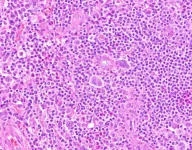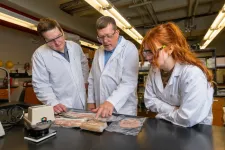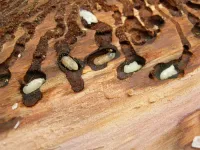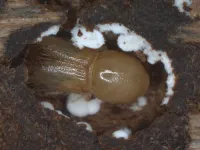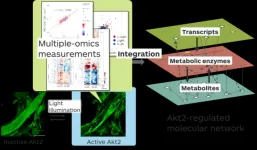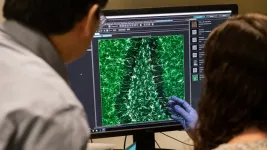BTI promotes faculty member Fay-Wei Li
Fay-Wei Li, an internationally-recognized expert on seed-free plants, has been promoted to Associate Professor at the Boyce Thompson Institute.
2023-02-21
(Press-News.org) The Boyce Thompson Institute (BTI) is delighted to announce that faculty member Fay-Wei Li has been promoted to Associate Professor on January 13. Li was evaluated on his achievements to date and likelihood of continued success in the future.
Since joining BTI in 2017, Li has developed an internationally-recognized program on seed-free plants, both in terms of genome sequencing and in making biological discoveries. He also is an excellent science communicator, with a knack for explaining the importance of scientific discoveries to a wide range of audiences.
The plant evolutionary biologist has particularly become known for his role in discovering new species, including a cyanobacterium isolated from a hornwort, an alga named after poet laureate Amanda Gorman, and a fern genus named after Lady Gaga.
Both internal and external colleagues strongly and unequivocally recommended Li’s promotion, providing many important contributions to science. Just a few examples of these comments include that Li is the “‘go-to’ genomics expert” in the area of seed-free plants, and that “he has an amazing skill for making basic science seem exciting to both scientists in other fields and the public.”
“Fay-Wei has become a widely known leader in the study of what are called seed-free plants, mainly ferns and hornworts,” says BTI President David Stern. “Many of these species are fascinating from an evolutionary and ecological point of view, but have been little studied. Fay-Wei’s work has been able to shed light on novel photosynthetic mechanisms, new symbioses, and he has also identified new species. Together, these discoveries have helped us learn about the origins of more familiar plants, while offering ideas that could be applied to plant modification in an era of climate change.”
“Like the ferns and other beautiful plants in our atrium, Fay-Wei’s work helps us appreciate biodiversity and causes us to think more deeply about the many roles that plants play in our world. As a highly collaborative and creative scientist, he is helping to spread this appreciation and understand the biological and evolutionary mechanisms that underly it,” adds Stern.
Paul Debbie, BTI’s Director of Research and New Business Development, says, “It has really been a pleasure over the past six years to watch Fay-Wei establish a new program here at BTI that is advancing an exciting field of plant evolution, and doing it with some of the most ancient and weird (his word!) plant species on the planet. Along with being a top-rated scientist, he has an innate ability to connect and communicate his science with the people in the world around us.”
BTI held a celebration party in Li’s honor on February 8. In classic form, Li read a speech written by the chatbot ChatGPT, which can be seen on the BTI website.
About Boyce Thompson Institute:
Opened in 1924, Boyce Thompson Institute is a premier life sciences research institution located in Ithaca, New York. BTI scientists conduct investigations into fundamental plant and life sciences research with the goals of increasing food security, improving environmental sustainability in agriculture, and making basic discoveries that will enhance human health. Throughout this work, BTI is committed to inspiring and educating students and to providing advanced training for the next generation of scientists. BTI is an independent nonprofit research institute that is also affiliated with Cornell University. For more information, please visit BTIscience.org.
###
END
[Attachments] See images for this press release:


ELSE PRESS RELEASES FROM THIS DATE:
2023-02-21
BINGHAMTON, N.Y. – So much of modern life is spent on screens: Zoom meetings and websites, smartphones and videogames, televisions and social media. How are all those pixels and rectangles affecting how we see?
Binghamton University, State University of New York Professor of Psychology Peter Gerhardstein and doctoral candidate Nicholas Duggan explore the phenomenon in “Levels of Orientation Bias Differ Across Digital Content Categories: Implications for Visual Perception,” recently published in the journal Perception. Their paper covers the extent to which online content ...
2023-02-21
CLEVELAND: Supported by a new $3.14 million grant from the National Institutes of Health to Cleveland Clinic, researchers are using an emerging technology known as “digital twins” to better understand healthcare disparities based on where someone lives. Researchers from Cleveland Clinic and MetroHealth aim to use this information to develop strategies designed to reduce these disparities in health outcomes.
The research team, led by Jarrod Dalton, Ph.D., of Cleveland Clinic, and Adam Perzynski, Ph.D., of MetroHealth, ...
2023-02-21
(MIAMI, FL, FEB. 21, 2023) – To create the most effective, personalized treatment plans for patients with Hodgkin lymphoma or other cancers, scientists and clinicians need the clearest picture of the genetic changes leading to the cancer’s development. That picture, say scientists at Sylvester Comprehensive Cancer Center in the University of Miami Miller School of Medicine, comes into much better focus when whole genome sequencing – rather than the current standard, exome sequencing – is used to identify changes driving the cancer.
Exome sequencing, which reads only protein-coding genes, can detect some specific mutations and other variants that propel cancers, ...
2023-02-21
Written by Kay Ledbetter, 806-547-0002, skledbetter@ag.tamu.edu
Imagine your favorite cured meat like beef jerky, pepperoni or bacon without any added sodium nitrite from any source currently necessary for color and shelf life. Wes Osburn, Ph.D., is doing exactly that.
At center, Wes Osburn, Ph.D., Texas A&M University meat scientist, is working in his lab with students Tanner Wright and Arlie Reeves on a new no nitrite-added cured meat system. (Texas A&M AgriLife photo ...
2023-02-21
Eurasian spruce bark beetles (Ips typographus) burrow into the bark of Norway spruce (Picea abies) trees where they mate and lay their eggs. Major outbreaks in Europe have decimated millions of hectares of conifer forests. The beetles preferentially attack trees that are already infected with symbiotic fungi (such as Grosmannia penicillata), which is thought to weaken host trees and break down their chemical defenses, allowing the beetles to successfully develop in the bark.
To investigate the chemical signals ...
2023-02-21
The mass outbreaks of bark beetles observed in recent years have caused shocking amounts of forest damage throughout Germany. As reported by the Federal Statistical Office in July 2022, more than 80% of the trees that had to be felled in the previous year were damaged by insects. The damaged timber felled due to insect damage amounted to more than 40 million cubic meters. One of the main pests is the European spruce beetle Ips typographus. In the Thuringian Forest and the Harz Mountains, for example, the beetle, which is only a few millimeters long, encountered spruce monocultures that had already been weakened by high temperatures and extended ...
2023-02-21
Takeaki Ozawa and his team from the University of Tokyo reveal the metabolic reactions upon activating an enzyme called Akt2. In doing so, they reveal the inner workings of insulin-regulated metabolism. The findings lead the way for Akt2-targeting therapeutics for diabetes and metabolic disorders.
It takes energy to do anything—even to exist. You can metabolize food to convert glucose into energy: thanks to many cascades of molecular reactions within your cells. As soon as you eat, your pancreas secretes insulin hormone, which starts ...
2023-02-21
SAN FRANCISCO, CA—February 21, 2023—Of all the known genetic risk factors for late-onset Alzheimer’s disease, the strongest is a gene for the protein called ApoE4. People with one copy of this gene are 3.5 times more likely, on average, to develop Alzheimer’s than others, and those with two copies face a 12-fold increased risk. However, exactly how ApoE4 boosts the risk of Alzheimer’s remains unclear.
Multiple types of cells in the brain make ApoE4—some of it is produced by neurons, but other brain cells called glia make it in higher quantities. For that reason, most prior research on this protein has focused on ...
2023-02-21
University Professor Douglas Rhoads has been named a Fellow of the American Association for the Advancement of Science, the world’s largest general scientific society and publisher of the journal Science.
As one of only 20 fellows representing the Section on Agriculture, Food & Renewable Resources, Rhoads was chosen by his peers and colleagues for advancing science and its applications in service to society. The organization elected a total of 505 fellows across 24 scientific sections.
Rhoads is director of the Interdisciplinary ...
2023-02-21
Researchers from Oregon Health & Science University and institutions across the country have identified a pill used to treat a common skin disease as an “incredibly promising” treatment for alcohol use disorder.
The study was recently published in the Journal of Clinical Investigation.
On average, the people who received the medication, called apremilast, reduced their alcohol intake by more than half — from five drinks per day to two.
“I’ve never seen anything like that before,” said co-senior author Angela Ozburn, Ph.D., associate professor of behavioral neuroscience in the OHSU School of Medicine and a research biologist ...
LAST 30 PRESS RELEASES:
[Press-News.org] BTI promotes faculty member Fay-Wei Li
Fay-Wei Li, an internationally-recognized expert on seed-free plants, has been promoted to Associate Professor at the Boyce Thompson Institute.


